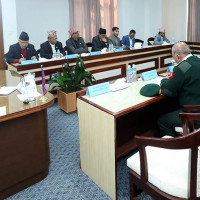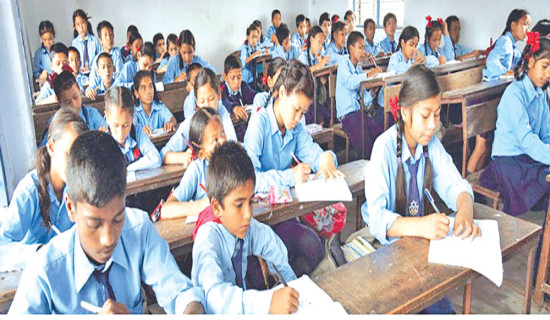- Wednesday, 18 February 2026
International Day of Play
Lack of playtime impairs children's well-being
Kathmandu, June 11: Children these days have been facing challenges in accessing adequate playtime opportunities thanks to the easy availability of electronic gadgets.
Many parents are occupied with their responsibilities. In the leisure time, children and their parents often spend time watching mobile devices and other screens. Additionally, limited outdoor space restricts children from playing outside freely. These factors directly impact children's well-being.
According to a 2019 survey conducted by the Central Bureau of Statistics and UNICEF, only 17 per cent of fathers spend time playing, singing and talking with their children aged 24 to 59 months. In contrast, the research shows that 42.1 per cent of mothers dedicate their time to their children. Likewise, 25 per cent of children are growing up under inadequate supervision of their guardians.
Likewise, only 6 per cent of private schools running classes for pre-school children have managed playing space for children while 19 per cent of community schools have managed the playing space, according to research conducted by the government’s Education Review Office in 2022.
According to an international organisation LEGO’s “Play Well Study 2024,” on average, three in five children would like to play more than they do now, while four in five children would like to play more with their parents or caregivers. The research also shows that eight of the 10 children say adults don't always think playing is important and seven in ten don’t believe that adults take them to play and how games help them learn seriously.
Concerning this global problem, the United Nations General Assembly recently adopted a resolution designating June 11 as the International Day of Play. This year, the UN is going to celebrate the first International Day of Play to recognise the importance of play in promoting education, development, and the well-being of children around the world.
The International Day of Play creates a unifying moment at global, national, and local levels to elevate the importance of play as central to children’s learning and well-being, ensuring time to play, space to play, and support for quality play is prioritised, UNICEF, a UN agency, said.
UNICEF stated that the celebration is meant to create awareness across the globe to call for policies, training, and funding to get play integrated into education and community settings worldwide.
The UN has been celebrating the month of June as parenting month. This year's theme of the Day of Play is ‘Promise of Playful Parenting’.
Games help children's physical, social, emotional and cognitive development, Dr. Dipu Shakya, early childhood development specialist at UNICEF, said.
Shakya stated that playful parenting also improved the mental health and wellbeing of parents and caregivers, strengthened bond and communication, improved parenting skills and automatically reduced screen time.
World Health Organisation (WHO) recommends that children have play engagement for 15-30 minutes per day as part of their recovery from undernutrition.
Sarmina Manandhar, communication specialist at the UNICEF, Nepal said they were planning to celebrate the first International Day of Play among the stakeholders to create awareness among them.
She asked parents to try new play ideas with children or spread awareness about the power of play among stakeholders.
















